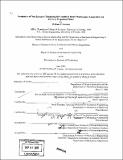Evaluation of non-intrusive monitoring for condition based maintenance applications on US Navy propulsion plants
Author(s)
Greene, William C. (William Calvin)
DownloadFull printable version (16.49Mb)
Other Contributors
Massachusetts Institute of Technology. Dept. of Mechanical Engineering.
Advisor
Steven Leeb.
Terms of use
Metadata
Show full item recordAbstract
The thesis explores the use of the Non-intrusive Load Monitor (NILM) in Condition Based Maintenance (CBM) applications on US Navy ships as part of the Office of Naval Research Electric Ship Integration (ESI) Initiative. The NILM is a device that measures an electrical component's performance by applying a single voltage and current transducer to a ship's existing power distribution system. The NILM was originally developed to monitor electrical power usage in buildings where it was noticed that it could disaggregate and report the operation of individual loads when many loads were present. The limits of this capability are explored by employing a signal processing script in MATLAB using component data gathered on the USCGC SENECA (WMEC-906). The plausibility of using a few NILMs to provide machinery monitoring information for an entire engineering space, and the resulting opportunity to reduce sensor growth on future Navy ships is explored. Then efforts to monitor naval propulsion plant machinery with the NILM are discussed. Two NILMs were constructed and installed on selected individual components at the Naval Surface Warfare Center Philadelphia DDG-51 Land Based Engineering Site (LBES). (cont.) Monitoring of the Fuel Oil and Low Pressure Air Service Systems was conducted during a week long certification of the pre-commissioning crew of the USS BAINBRIDGE (DDG-96). Data collected was then used to explore the use of the NILM as a diagnostic device for shipboard systems through the evaluation of mechanical transients in the Fuel Oil system and a test leak inserted into the Low Pressure Air System. Additionally, a brief overview of the Multi-function Monitor (MFM), a type of electrical protection equipment installed on many US Navy ships, is provided. The MFM could provide a natural installation point on the ship's power distribution system to monitor a multiple loads. Finally, an evaluation of the NILM as an enabling technology for Navy CBM was conducted. The Integrated Condition Assessment System (ICAS) is the U.S. Navy's "Program of Record" for CBM and is currently installed on over 97 ships fleet wide. NILM data from individual components at the LBES was monitored simultaneously with ICAS and the results are compared.
Description
Thesis (S.M.)--Massachusetts Institute of Technology, Dept. of Ocean Engineering; and, (S.M.)--Massachusetts Institute of Technology, Dept. of Mechanical Engineering, 2005. Includes bibliographical references (p. 107-108).
Date issued
2005Department
Massachusetts Institute of Technology. Department of Mechanical Engineering; Massachusetts Institute of Technology. Department of Ocean EngineeringPublisher
Massachusetts Institute of Technology
Keywords
Ocean Engineering., Mechanical Engineering.